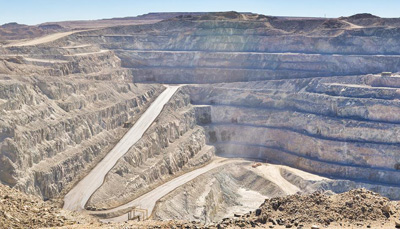
Chinese state-owned companies now control entire Namibian uranium industry

Rio Tinto plc announced that the sale of its shares in Rössing Uranium has been completed after approval from the Namibian Competition Commission. Both extant Namibian uranium mines now belong to Chinese state-owned companies. The third mine, Langer Heinrich, became dormant in 2017 following a decision by its Australian shareholders not to sell to a Chinese concern.
In a notice to the Australian Stock Exchange and the London Stock Exchange, Rio Tinto stated this week that its entire interest in Rössing Uranium Ltd has been relinquished to China National Uranium Corporation Limited for an upfront cash payment of US$ 6.5 million and contingent payments that may top US$ 100 million. This amount is linked to the uranium spot price for the next seven years and the mine’s net income over the same period.
In April this year, Rössing said in its annual stakeholder report that the deposit will be depleted by 2025, which is also the basis for the seven-year timeframe that determines the deal with the Chinese. However, the new Managing Director, Richard Storrie stated that the intended sale may prolong the mine’s life beyond 2025.
The mining conglomerate’s Chief Executive, J-S Jacques was quoted as saying “This sale demonstrates Rio Tinto’s commitment to further simplifying and strengthening our portfolio and brings the total divestment proceeds received since 2017 to US$11.2 billion, of which US$ 9.7 billion has been returned to our shareholders.”
Rio Tinto held 68.62% of the shares in Rössing Uranium Ltd. The Iranian Government through the Iranian Foreign Investment Company holds 15%, a legacy holding that originated from the time when Iran was still ruled by the Shah. The Industrial Development Corporation of South Africa holds 10% of the shares and the Namibian Government 3%. Under the previous dispensation, the Namibian Government had 51% of the voting rights.
The intended sale to China National Uranium Corporation was first announced in November last year after Rio Tinto concluded a binding agreement with the Chinese suitor.
Rio Tinto’s about face with Rössing is widely seen as a move to relieve itself of a mining operation which has come to end of life. Talks of shutting the mine down has been prominent on at least two occasions over the past twenty years. The mine was saved however, through the discovery of additional ore bodies and through improvements in mining technology.
As late as 2012, Jerome Mutumba who is currently with the Development Bank of Namibia, stated then that Rio Tinto was investigating the options to jointly develop the new Husab Uranium mine with the Chinese Government.








































